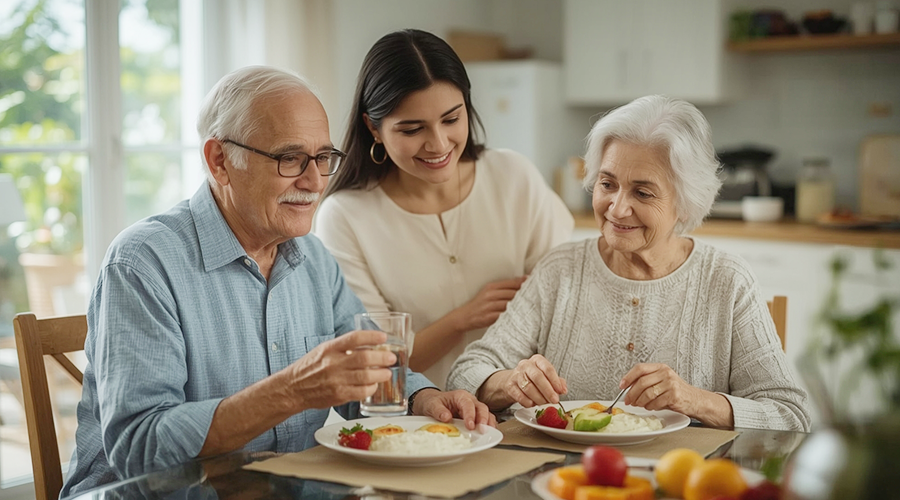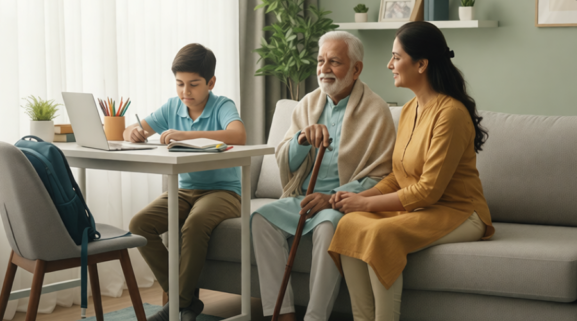Senior Digestive Health: Understanding and Managing Common Challenges in the 80s and Beyond
Digestive issues—such as chronic indigestion, constipation, or alternating constipation and diarrhea—are extremely common in seniors, especially after the age of 80. These problems are often linked to age-related changes in digestion, reduced physical activity, multiple medications, and underlying health conditions. While medications play a role, simple lifestyle remedies – like hydration, fiber balance, gentle mobility, and mindful eating—can make a meaningful difference. This article combines medical insights, practical family strategies, and a real-life caregiving story to help families support their aging parents with empathy and ease.
Why Are Digestive Problems So Common in Seniors?
By the time someone crosses 80, digestion rarely works as smoothly as it once did. Ageing brings natural physiological changes:
- Slower gut motility: The intestines move food more slowly, often leading to constipation [BMC Geriatrics, 2023].
- Weakened muscles & nerves: This affects bowel movements, swallowing, and gastric emptying.
- Polypharmacy (multiple medications): Common in seniors, especially with chronic illnesses. Drugs for the heart, Parkinson’s, or pain relief can all disrupt digestion [WHO, 2021].
- Reduced physical activity: Less movement means slower digestion.
- Dietary changes: Seniors often eat less, avoid fibrous foods, or consume too many refined foods.
A review in Ageing & Society highlights that digestive issues are one of the top five recurring complaints among seniors globally, impacting quality of life as much as mobility challenges [Cambridge University Press, 2021].
A Real Family Story: My Father’s Struggle at 82
My father is 82 and lives with multiple health conditions—multiple myeloma, a heart condition requiring a CRT-D device, and early Parkinson’s. With all these factors, digestion has become one of the toughest daily battles.
Here’s what happens often:
- He goes through days of constipation, then suddenly has episodes of diarrhea, leaving him weak and fatigued.
- Medications help for a while, but no single pill keeps working long-term. Doctors frequently adjust them, but the cycle continues.
- The real challenge comes after diarrhea episodes—he becomes drained, with low energy and appetite, making recovery harder.
This experience has shown our family that while medications are essential, lifestyle remedies are just as powerful in maintaining stability and comfort.
What Lifestyle Remedies Can Help Senior Digestion?
Note: Always consult a doctor before making changes. These are gentle, widely recommended lifestyle approaches—not medical prescriptions.
1. Hydration First
- Seniors often under-drink because their sense of thirst declines with age.
- Dehydration worsens both constipation and post-diarrhea recovery.
- Tip: Keep a water bottle near them, or encourage warm water/herbal teas (like fennel or chamomile).
2. Balanced Fiber (Not Just More Fiber)
- While fiber is important, too much can worsen bloating and discomfort.
- Insoluble fiber (bran, raw veggies) can be harsh on fragile digestion.
- Gentle fibers like oatmeal, soft fruits (papaya, stewed apples), and lentils are often better tolerated.
3. Smaller, Frequent Meals
- Instead of 2–3 heavy meals, seniors do better with 4–5 smaller meals spread through the day.
- Prevents bloating, eases digestion, and keeps blood sugar stable.
4. Gentle Movement
- Even a 10–15 minute walk after meals can stimulate bowel function.
- Chair exercises or simple stretches can also help.
- Studies show that physical activity significantly reduces constipation risk in seniors [WHO, 2021].
5. Mindful Eating Habits
- Encourage slow eating and chewing thoroughly.
- Avoid late-night heavy dinners.
- Limit processed foods and excess dairy, which often trigger indigestion.
6. Restoring Energy After Diarrhea
- Hydration with ORS (oral rehydration solution) or coconut water.
- Light, easily digestible foods: khichdi, soups, curd rice, or bananas.
- Rest + gentle reintroduction of normal meals as strength returns.
Which Foods Support Senior Digestion Best?
| Category | Gentle, Digestive-Friendly Foods | Foods to Avoid / Limit |
|---|---|---|
| Fruits | Papaya, stewed apples, pears, ripe bananas | Raw salads, citrus if causing acidity |
| Grains | Oats, rice, khichdi, soft rotis | White bread, heavy fried snacks |
| Proteins | Lentils (moong dal), curd, soft paneer, fish | Red meat, fried proteins |
| Drinks | Warm water, fennel/chamomile tea, coconut water | Carbonated drinks, excess caffeine |
| Extras | Probiotics (curd, yogurt, kefir) | Excess sugar, spicy pickles |
Senior Care Joy Insight: Sometimes it’s not about adding more food groups, but simplifying meals so the body doesn’t struggle with digestion.
What Role Do Families Play in Supporting Seniors?
Digestive discomfort can make seniors feel embarrassed, frustrated, or isolated. Families can help by:
- Normalizing the struggle: Remind them it’s common at this age, not a personal failure.
- Being observant: Track bowel patterns, food triggers, and hydration levels.
- Avoiding pressure: Don’t force them to eat when appetite is low. Offer small, frequent options instead.
- Encouraging conversation: Talking openly about digestion reduces stress and helps doctors adjust treatment better.
Research shows that emotional support and reduced stress directly improve gut health outcomes, even in seniors [NHS, 2022].
When to Seek Medical Attention?
While lifestyle remedies help, it’s important to know when to involve doctors urgently:
- Persistent constipation (more than 3–4 days with no relief).
- Severe diarrhea lasting more than 24 hours.
- Blood in stool or black, tarry stools.
- Sudden unexplained weight loss.
- Abdominal pain that doesn’t settle.
Doctors may adjust medications, check for side effects, or run tests to rule out serious causes.
Closing Summary
Digestive challenges in the 80s and beyond are extremely common—but they don’t have to rob seniors of comfort or joy. Families who combine medical support with simple lifestyle adjustments – hydration, fiber balance, gentle activity, and empathetic caregiving—can make daily life easier for their parents.
For us, the journey with my father has been about learning, adjusting, and finding balance. Medications come and go, but small everyday practices—like a bowl of warm papaya, a slow evening stroll, or keeping him hydrated—often make the biggest difference.
Key Takeaways
- Seniors’ digestion slows naturally with age; multiple medications often add to the struggle.
- Lifestyle remedies (hydration, balanced fiber, smaller meals, gentle activity) are highly effective.
- Families should normalize digestive issues and support seniors emotionally as well as physically.
- Medical input remains essential when symptoms persist or worsen.
Question for Readers: Have you found any simple remedies – like a particular food, routine, or ritual—that worked wonders for your parents’ digestion? Share with us—we’d love to learn from your experience.


